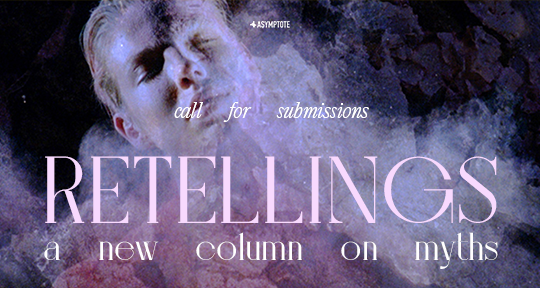Across cultures and time, people have turned toward myths for their wisdom and experience. Even today, when ‘myth’ has become synonymous with ‘falsehood,’ we are drawn to the weight and impact of mythology in contemporary literature and media; from Ngũgĩ wa Thiong’o’s 2018 retelling of the Kĩkũyũ myth of origin in The Perfect Nine, to Madeline Miller’s 2018 retelling of the myth of Odysseus in Circe, to Makoto Shinkai’s expansion on the myth of Namazu in the 2022 film Suzume, myths prevail in modern consciousness, woven into our lives, retold and retold again.
In this way, myths are inherently translational. From one mouth to the next, from the oral to the written, from one language to another, from antiquity to contemporary retellings, they have all been acts of translation. But what does it mean to translate myths, embodiments of reason, morality, and culture? How do our personal lived experiences reshape myths in retelling? How do cultural values and the bounds of language influence translations of myths? When a translator approaches a retelling with an explicit agenda, such as Thiong’o’s feminist approach to the Kĩkũyũ origin myth, what does that mean for the myth itself? When we read myths, when we relate to and learn from and shape these ancient texts to fit our modern lives, is that not its own form of translation? And again, what happens to the myth itself in these myriad retellings?
Here at the Asymptote blog, we are headlining a new column on myths and myths in translation, Retellings, and would like your submissions and pitches! We are interested in the following approaches, and more than open to any other formats:
- In the language you work from, what myth has had a particular impact on you? How does the language of the myth move you, as a reader, and how has the myth affected the legacy of literature in its language?
- Myths of creation; of origin; of love; of conquering—how do these vary across cultures? What aspects remain constant? We would particularly be interested in hosting a group of translators from various languages in a roundtable to discuss these questions.
- How does a myth develop in translation? When a myth is translated from the ‘original’ language to another, do the morals, message, and impact transform in turn? In what ways? How does translation between languages differ from other retellings?
Completed essays can be submitted to the blog on Submittable until May 15, and pitches can be emailed to the blog editors at blog@asymptotejournal.com. Please include the language you translate from and/or work in, as well as any particular myth or type of myth you are interested in discussing in your email.
We’re looking forward to your submissions!
—The Blog Editors




